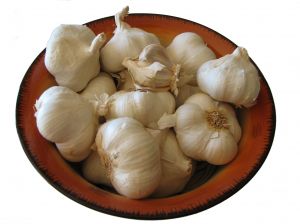I'm sure you've already heard how good garlic can be for cholesterol and high blood pressure, but that's not all that garlic can do. The medicinal use of garlic goes back through ancient history, and has been used to cure and prevent many illnesses for many generations. Most commonly today, it is avoided due to it's reputation for causing bad breath. Some people may even cook with it thinking that they may use "a little extra" for their health, and not just for flavor. But the amount that most people would tolerate as a flavoring is much less than the dosages used for natural healing.
Garlic, or the stinking rose as it is sometimes referred to, contains an antibiotic and anti-fungal properties. To benefit from the antibiotic properties, the garlic must be well guarded from heat, especially the microwave. The chemical, allicin, which is produced when garlic is chopped or crushed, is quite sensitive to heat. While there are many healing properties to garlic even once it has been cooked, the antibiotic properties are greatly diminished during the cooking process. Too much raw garlic is not without side effects, and one should take great care when eating raw garlic, as it can cause irritation to the stomach lining, and even ulcers. Some people can develop skin irritation when coming in contact with raw garlic.
As for bad breath, garlic does not have to be eaten to end up causing the odor - if you put a clove of garlic in your sock you would be able to smell it on the breath in about an hour. Not many people enjoy the smell it can create within a person, however, the power of garlic to enter into the blood stream and saturate every part of the body is nearly unmatched. Using other herbs to counteract the odor can be extremely useful, such as parsley. However, parsley is a diuretic, used in herbal medicine to relieve water retention, could cause dehydration if too much is taken. For a basic rule of thumb when making herbal teas, including parsley, stick to one teaspoon per 8 oz. of water, which is a typical adult dose of dried herb. Take extra precaution anytime you are taking an herb for the first time, and consider the advice of a qualified medical professional whenever you question your body's ability to tolerate medicinal herbs.
Technorati tags:
food, food and drink, health, health and wellness, herbal medicine, herbs, life, nutrition

0 comments:
Post a Comment